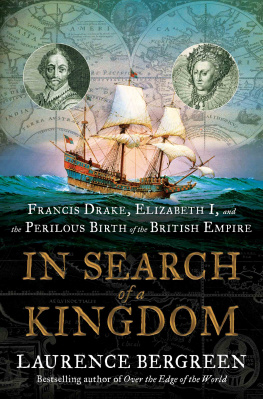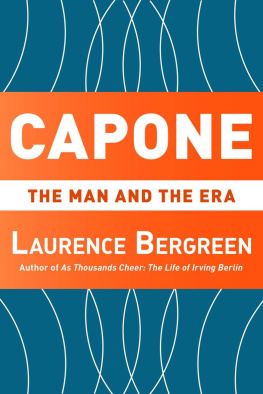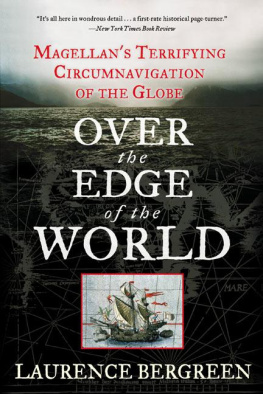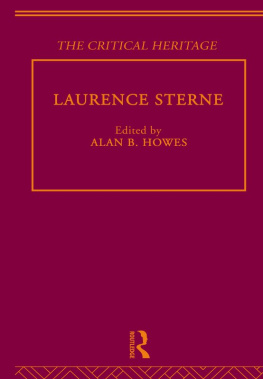Laurence Bergreen - In Search of a Kingdom
Here you can read online Laurence Bergreen - In Search of a Kingdom full text of the book (entire story) in english for free. Download pdf and epub, get meaning, cover and reviews about this ebook. year: 2020, publisher: Custom House, genre: Non-fiction. Description of the work, (preface) as well as reviews are available. Best literature library LitArk.com created for fans of good reading and offers a wide selection of genres:
Romance novel
Science fiction
Adventure
Detective
Science
History
Home and family
Prose
Art
Politics
Computer
Non-fiction
Religion
Business
Children
Humor
Choose a favorite category and find really read worthwhile books. Enjoy immersion in the world of imagination, feel the emotions of the characters or learn something new for yourself, make an fascinating discovery.
- Book:In Search of a Kingdom
- Author:
- Publisher:Custom House
- Genre:
- Year:2020
- Rating:3 / 5
- Favourites:Add to favourites
- Your mark:
- 60
- 1
- 2
- 3
- 4
- 5
In Search of a Kingdom: summary, description and annotation
We offer to read an annotation, description, summary or preface (depends on what the author of the book "In Search of a Kingdom" wrote himself). If you haven't found the necessary information about the book — write in the comments, we will try to find it.
In Search of a Kingdom — read online for free the complete book (whole text) full work
Below is the text of the book, divided by pages. System saving the place of the last page read, allows you to conveniently read the book "In Search of a Kingdom" online for free, without having to search again every time where you left off. Put a bookmark, and you can go to the page where you finished reading at any time.
Font size:
Interval:
Bookmark:

Maps by Jeffrey L. Ward

Maps by Jeffrey L. Ward
To Jacqueline
England
Burroughs, William (15361599). Naval commander. Hanged ten masters of pirate ships in 1583. Vice admiral during Francis Drakes raid on Cdiz in 1587. Tried and acquitted on charges of mutiny.
Carder, Peter. Escaped ships boy who claimed to walk across Brazil before catching a boat to England.
Cecil, William, Baron Burghley (15201598). Queen Elizabeths chief minister. Appointed Lord High Treasurer in 1572. Died in his London home in 1598.
Dee, John (15271608). Mathematician, astronomer, astrologer, alchemist. Influential adviser to Queen Elizabeth. Formulated the concept of the British Empire.
Devereux, Robert, 2nd Earl of Essex (15651601). Late-life intimate of Queen Elizabeth. When he ran afoul of her, she had him executed.
Doughty, Thomas. Nobleman. Mutineer. Condemned to death by Drake in Port Saint Julian, Argentina, 1578.
Drake, Sir Francis (15401596). Eldest of twelve sons of Edmund Drake. Second cousin of Sir John Hawkins, with whom he sold slaves in the Caribbean. Led the first successful circumnavigation, 15771580. Vice admiral of the English fleet during the Armada period. Died of dysentery and buried at sea near Portobello, Panama, in January 1596.
Drake, John. Francis Drakes nephew.
Dudley, Robert, Earl of Leicester (15321588). Fifth son of John Dudley, the executed Duke of Northumberland. Suspected of murdering his first wife, Amy Robsart.
Elizabeth I (15331603). Daughter of Henry VIII and Anne Boleyn, his second wife.
Fletcher, Francis. Drakes chaplain during the circumnavigation, maintained a journal of the voyage, which formed the basis of The World Encompassed by Sir Francis Drake.
Frobisher, Sir Martin (15391595). Navigator. Led three voyages to the New World. Commanded Triumph in Battle of the Spanish Armada. Died at Plymouth.
Hawkins, Sir John (15321595). Privateer, slaver, Drakes mentor. Treasurer of the navy. Commanded Victory in Armada battle. Knighted. Died off Puerto Rico during a campaign with Drake.
Howard, Charles, Second Baron Effingham (15361624). Eldest son of William Howard. Appointed Lord High Admiral of England, 1585. Led the English fleet against the Armada in 1588. Fought in the Battle of Gravelines.
Mary I (15161558). The sole surviving child of Henry VIII and Katherine of Aragon, his first wife. Married King Philip of Spain in 1554. Died childless in London.
Newman, Mary (m. 1569, d. 1583). Francis Drakes first wife.
Norreys, Sir John (15471597). Military commander involved in the notorious massacre of Scots at Rathlin Island. Knighted by Leicester. Led unsuccessful campaign with Drake to install Dom Antnio, the Portuguese pretender to the throne, in 1589.
Oxenham, John. First non-Spanish explorer to traverse the Isthmus of Panama (1575). Fought with Drake against the Spanish in two early campaigns in Central America, captured by the Spanish in 1578, executed in Lima on September 30, 1580.
Pretty, Francis. Drakes gentleman-at-arms.
Sydenham, Elizabeth (15401596). Francis Drakes second wife.
Walsingham, Sir Francis (15321590). Queen Elizabeths spymaster and minister. Knighted in 1577. Died in London deeply in debt.
Scotland
James VI of Scotland (15661625). Son of Mary, Queen of Scots. Succeeded Queen Elizabeth.
Mary, Queen of Scots (15421587). Only surviving legitimate child of James V of Scotland, who died six days after she was born. Heir presumptive to English crown as a descendant of Henry VIIIs elder sister, Margaret. She fled Scotland in 1568, and was detained by Elizabeth I for nineteen years until she was executed.
Spain
de Antn, San Juan. Captain of Cacafuego, captured by Drake off Brazil.
de Figueroa, Gmez Surez, Fifth Count de Feria (15201571). The Duke of Feria, as he was later known, served as Philips representative in England from 1557 to 1559.
de Mendoza, Bernardino (15401604). Spanish ambassador and spy to London from 1578 to 1584.
de Ziga-Sotomayor, Alonso Prez de Guzmn y, 7th Duke of Medina Sidonia (15501615). Commander of the Spanish Armada that was to attack the south of England in 1588.
Farnese, Alexander, Duke of Parma (15451592). His mother was King Philips half sister. Failed to carry out a planned rendezvous with Medina Sidonia during the battle of the Spanish Armada.
Philip II of Spain (15271598). Philip the Prudent ascended to the throne after his father, Charles V, Emperor of the Holy Empire, abdicated in 1556. At various times, he was king of Spain, Portugal, Naples, Sicily, England, and Ireland. He died at the Palace of El Escorial.
Vatican
Gregory XIII (15021585). Pope 15721585. A reformer who tried to discourage the spread of Protestantism by founding new colleges for priests. He celebrated the massacre of the Protestant Huguenots in Paris in 1572 with a mass in Rome.
Pius V (15041572). Pope 15661572. Excommunicated Elizabeth I on February 25, 1570.
Sixtus V (15201590). Pope 15851590. Although fond of Elizabeth, he renewed the excommunication and promised to grant Philip II a generous subsidy after the Spanish Armada arrived in England.
F or the sake of consistency, I have followed the modern, Gregorian calendar for all events in all locations.
In 1582, Pope Gregory XIII replaced the Julian calendar, in effect since 45 BC, with a new calendar to compensate for errors accumulated over time. The Gregorian calendar omitted ten days, so October 5, 1582, became October 15 in Catholic countries such as Spain. But Protestant countries continued to follow the traditional Julian calendar, some until the twentieth century. England made the switch in 1752.
The change has led to some confusion. For example, older records state that Francis Drake departed from Plymouth December 23 on his circumnavigation. In our modern calendar, the equivalent is December 13.
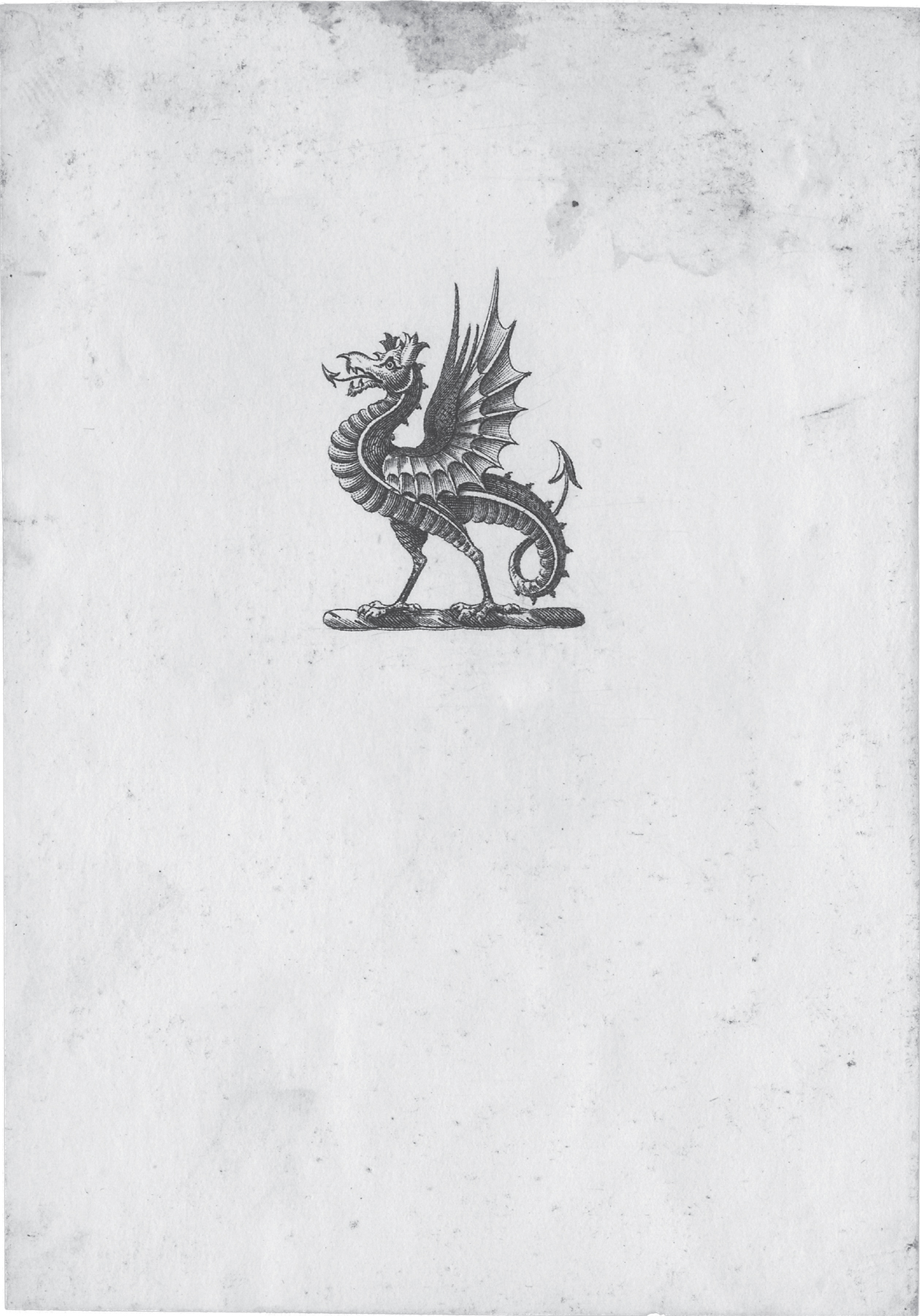
A wyvern, or two-legged dragon, Francis Drakes heraldic symbol
(The Rare Book & Manuscript Library, University of Illinois at Urbana-Champaign)
The Pirate
O n the morning of December 13, 1577, Francis Drake, a pirate and former slaver, ordered his small fleet in Plymouth, England, to weigh anchor. The ships stood out against a bleak background. They were colorfully painted, with billowing sails, and boisterous sailors calling to one another.
Plymouth lies 190 miles southwest of London, surrounded by two ancient rivers, the Plym and the Tamar, both running into Plymouth Sound to form a boundary with the neighboring county, Cornwall. It was a tranquil town, mostly farmland gathering into a peninsula jutting into a bay. Drake, from nearby Devon, made Plymouth his base of operations. The port was recognized for its shipping, and it also served as a hub of the English slave trade. It was not an innocent place. In folklore, Devon harbored witches and the Devil himself.
The fleets destination was unknown, but they would not be home by Christmas or even the next, not if Drakes ambitious plan was successful. Many aboard had a financial stake in the voyage, and they might return prosperous. Or, just as likely, they might never see Plymouth again. Weeks earlier, the Great Comet of 1577 had passed overhead, an event taken across Europe as a sign, portent, or warning that a great event would soon unfold. Comets, those mysterious, phosphorescent messengers from the far reaches of space, coincided with the commencement of a new age.
Font size:
Interval:
Bookmark:
Similar books «In Search of a Kingdom»
Look at similar books to In Search of a Kingdom. We have selected literature similar in name and meaning in the hope of providing readers with more options to find new, interesting, not yet read works.
Discussion, reviews of the book In Search of a Kingdom and just readers' own opinions. Leave your comments, write what you think about the work, its meaning or the main characters. Specify what exactly you liked and what you didn't like, and why you think so.

